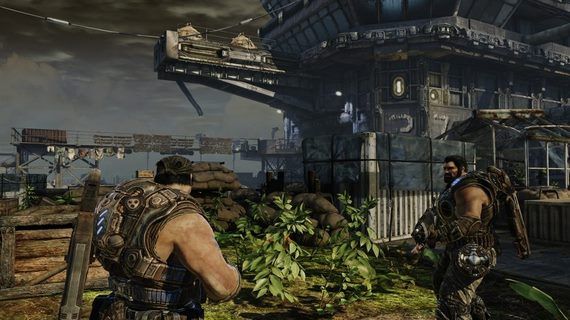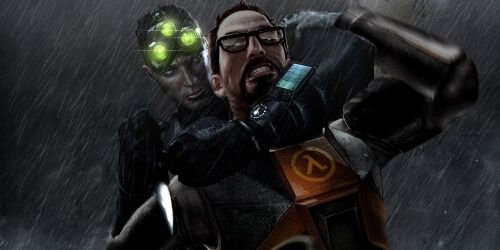It's a simple fact when producing any product committed to a firm release date that sometimes the unexpected will happen, and you will have no choice but to admit to the world that you couldn't get it done on time. While a big disappointment to many fans eagerly anticipating the day, nobody gets hurt, and a new date is later set and hit. So why does the story get so much more complicated when it comes to the gaming industry?
If you've been following Game Rant for a while, then you're well aware that many anticipated titles coming out of E3 have had to announce delays in production, like Homefront and Gears of War 3. Not too long before those titles, it was Splinter Cell: Conviction that was being given the shove into the next calendar year. Valve even decided to delay the release of Portal 2, only weeks before they planned to make a grand spectacle of the game at E3. So it's clear that even large-scale developers run into the same issues that any company does when working toward a deadline.
But these are the best case scenarios for the games when it comes to announcing a delayed release: the game simply needs more time. In the case of Conviction, Ubisoft had suffered a poor sales year, and decided to postpone the game to optimize performance in the next fiscal year. Game developers are out for profits after all, a fact that Epic Games' Rod Fergusson, Executive Producer for Gears 3, also made clear by pointing out that the decision to postpone the release was "a business decision between partners, and not a quality issue."
The business decision was to place Gears of War 3 in the holiday-shopping season of Fall 2011, as opposed to its previous date in the spring. It may not be the best news for fans to hear, but it's a truth of the business that games are only made to be profitable, and if they are, we'll get more of them. As an added bonus, it gives developers a bit more time to fine-tune their game prior to release. With Epic having already announced the improvements they've made to multiplayer by adding dedicated servers, who knows how many more tweaks and adjustments can be made with the extra development time.
With that in mind, a question arises: why even bother to announce a set date if you are aware that you might not be able to make it? The fact is that developers are charged with making the game, and the publisher's job is to sell copies.
It's definitely a relief to see a publisher giving a development team more time, as opposed to pressuring them to finish earlier. It's never nice to see storytellers and artists being given directions by the so-called "suits" of the industry, or any industry in general. Just look at EA's Need For Speed series, the decline of which EA has now admitted was their own fault, after making excessive demands on the development teams involved. While some may disagree with Microsoft's decision to postpone Epic's third entry in the Gears franchise, it's hard to dispute their assumption that the game will sell better if it is released during the holidays.
And as with Valve's Portal 2, and Blizzard's upcoming Cataclysm, the developer in question has released enough quality content in the past to gain the benefit of the doubt that the extra time will ultimately yield a better product. After all, when Bungie finally released Halo 2 after several delays, that game went on to become one of the greatest entertainment launches in history, regardless of how the end product turned out. Keep in mind that Bungie was depending on the hype and buzz of only a single previous title, not an entire franchise. Ironically, some examples show that the more popular a property becomes, the more freedom that developer has to torture their fanbase by releasing a game whenever they feel it's ready.
Valve, creators of Half-Life, Team Fortress, Portal, and Counter-Strike have become synonymous with "triple-A title" when it comes to PC games, and rightly so. By delivering games with such incredibly high production value and support through SteamWorks, and finding new streams of income, Valve now holds the keys to its own future. As a result, fans now have no choice but to wait for Valve to finish up Portal 2 and whatever other Left 4 Dead DLC they're working on, and finally get to releasing Half-Life 3, or Half-Life 2 Episode 3. And we, the fans, must wait. To Valve's credit, they've given gamers plenty to keep them occupied. Even the mere mention of their E3 "surprise" sent the internet into a frenzy over Half-Life rumour-milling. But such is the price of fan loyalty, it would seem.
Continue to page two of Game Rant's To Delay or Not To Delay: It's Becoming the Question.
For many game studios, the pressure to release a quality title on time just isn't a factor. If a company has achieved enough success to develop a fan following and loyalty, they are free to take as much time in development as they see fit. Blizzard took 12 years to release StarCraft II, the sequel to the RTS that kept Koreans busy playing online competitively for millions of dollars in the meantime. The upside of all this is that these companies have received so much recognition for the projects they've already completed, we can now join them in feeling secure that we have many more years of their ideas to enjoy.
And then there's Gran Turismo 5. Already at more than five years since GT4, the seemingly endless development cycle has become the butt of jokes for some in the industry, and has recently run the risk of approaching Duke Nukem Forever levels of myth. But how could this possibly be? From the beginning of the series, the game revolutionized the racing sim to so great an extent that we consider it to be one of the greatest moments in the history of the PlayStation.The franchise remains one of the most cutting-edge in its genre to this day, and constantly seems to set the bar higher within the racing game arena. And therein lies the rub. Gran Turismo's development team Polyphony Digital seems to stand as the posterboy for what can happen when the desire to produce the best game on the market isn't tempered with a little immediacy.
I was one of the many who purchased Gran Turismo 5: Prologue for more than a few dollars in 2008, expecting it to appease my appetite for the next year, until the full game was released. But now it remains unclear just how much of Prologue has even been carried over into the upcoming release. The game's release is less than a month away, and at least in my case, my feelings for the franchise have been soured. When you delay a game's production so long, the expectations rise higher and higher. With so many new properties released since 2005, even 2008, you have to wonder how many times Polyphony has had to adapt, or reshape the game to keep its level of performance at the top of the heap. Nevertheless, all of the arguments may as well be shouted at a wall, since Gran Turismo 5 will almost certainly be one of the highest selling games of the year. Even though Polyphony's already thinking about GT6.
But not all game developers can be so lucky. Alan Wake, the mysterious, grim psychological thriller-shooter from Remedy is another game that the developers felt they had to take their time with. While the small studio went through a lengthy development cycle, they scrapped the plans for a multi-platform release, only to finally come up with a finished product in the summer of this year. But perhaps Microsoft should have looked at delaying its release as a means of protecting their investment, and avoiding a mismatch in competition. Because while we thought the game turned out great, it had the misfortune of being released alongside Red Dead Redemption.
Rockstar Games' cowboy action game seemed to combine the best of both worlds: take the development team behind the original Red Dead Revolver, Rockstar San Diego, and match them up with Rockstar North, the developer who had proven their open-world gaming cred with the Grand Theft Auto series. While many publishers wish to accelerate development cycles to get around the costs of delays, it seems that Rockstar knew something we didn't. After making one of, if not the most expensive game ever, Redemption apparently put the money where it counted, going on to sell millions of copies.
Delays can be positive, in the case of StarCraft II and Diablo 3, negative in the case of NBA Elite 11, or potentially worrisome in the case of L.A. Noire. But a delay doesn't have to be a confession, it can simply be a decision. So while the word "delay" may flash as a negative, or send red flags flying at first glance, it's important to remember that there are at least two sides to the decision, if not more.
What are your thoughts on games being delayed? Do you trust the opinions of the developers and publishers, or do you want them to hold up their end of the deal, and release the game when they said they would? Sound off in the comments below.




